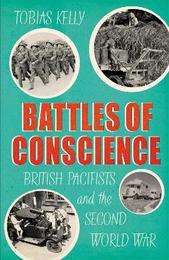
|
Battles of Conscience: British Pacifists and the Second World War
Hardback
Main Details
| Title |
Battles of Conscience: British Pacifists and the Second World War
|
| Authors and Contributors |
By (author) Tobias Kelly
|
| Physical Properties |
| Format:Hardback | | Pages:384 | | Dimensions(mm): Height 245,Width 170 |
|
| Category/Genre | True Stories - Discovery
True War and Combat Stories
British and Irish History
Second world war |
|---|
| ISBN/Barcode |
9781784743949
|
| Classifications | Dewey:940.531620941 |
|---|
| Audience | | General | | Tertiary Education (US: College) | | Professional & Vocational | |
|---|
|
Publishing Details |
| Publisher |
Vintage Publishing
|
| Imprint |
Chatto & Windus
|
| Publication Date |
5 May 2022 |
| Publication Country |
United Kingdom
|
Description
Fascinating new history of WW2 from the world expert on conscience, Anthropology Professor Tobias Kelly. A ground-breaking new study brings us a very different picture of the Second World War, asking fundamental questions about ethical commitments Accounts of the Second World War usually involve tales of bravery in battle, or stoicism on the home front, as the British public stood together against Fascism. However, the war looks very different when seen through the eyes of the 60,000 conscientious objectors who refused to take up arms and whose stories, unlike those of the First World War, have been almost entirely forgotten. Tobias Kelly invites us to spend the war five of these individuals- Roy Ridgway, a factory clerk from Liverpool; Tom Burns, a teacher from east London; Stella St John, who trained as a vet and ended up in jail; Ronald Duncan, who set up a collective farm; and Fred Urquhart, a working-class Scottish socialist and writer. We meet many more objectors along the way -- people both determined and torn -- and travel from Finland to Syria, India to rural England, Edinburgh to Trinidad. Although conscientious objectors were often criticised and scorned, figures such as Winston Churchill and the Archbishop of Canterbury supported their right to object, at least in principle, suggesting that liberty of conscience was one of the freedoms the nation was fighting for. And their rich cultural and moral legacy -- of humanitarianism and human rights, from Amnesty International and Oxfam to the US civil rights movement -- can still be felt all around us. The personal and political struggles carefully and vividly collected in this book tell us a great deal about personal and collective freedom, conviction and faith, war and peace, and pose questions just as relevant today- Does conscience make us free? Where does it take us? And what are the costs of going there? ' An excellent book' - DAILY TELEGRAPH 'A moving tribute' - SPECTATOR
Author Biography
Tobias Kelly is Professor of Political and Legal Anthropology at the University of Edinburgh where his research focuses on the cultural history of war, violence and human rights. He has a PhD from the London School of Economics and has held visiting positions at New York University and the University of Oxford. He lives in in Edinburgh with his family.
Reviews[An] excellent book... [Kelly] sheds light on a little considered aspect of the war -- Patrick Bishop * Daily Telegraph * A moving tribute to moral courage, and a scholarly memorial of more innocent times * Allan Mallinson, Spectator * [Battles of Conscience] takes five pacifists...and skilfully weaves their stories into a broader narrative about how claims of conscience ruled the lives of the 60,000 British citizens who stood apart as conscientious objectors through [WWII] * Times Literary Supplement * [An] intriguing, original book... Kelly makes a fair case for...[the] importance in thinking through the collective and individual duties of citizens in a national public emergency * Literary Review * An intriguing, original book . . . Kelly is sympathetic towards but clear-eyed about his cast of characters . . . their importance in thinking through the collective and individual duties of citizens in a national public emergency . . . questions which are hardly irrelevant in an age of pandemics, lockdowns and vaccine mandates -- Alan Allport * Literary Review *
|